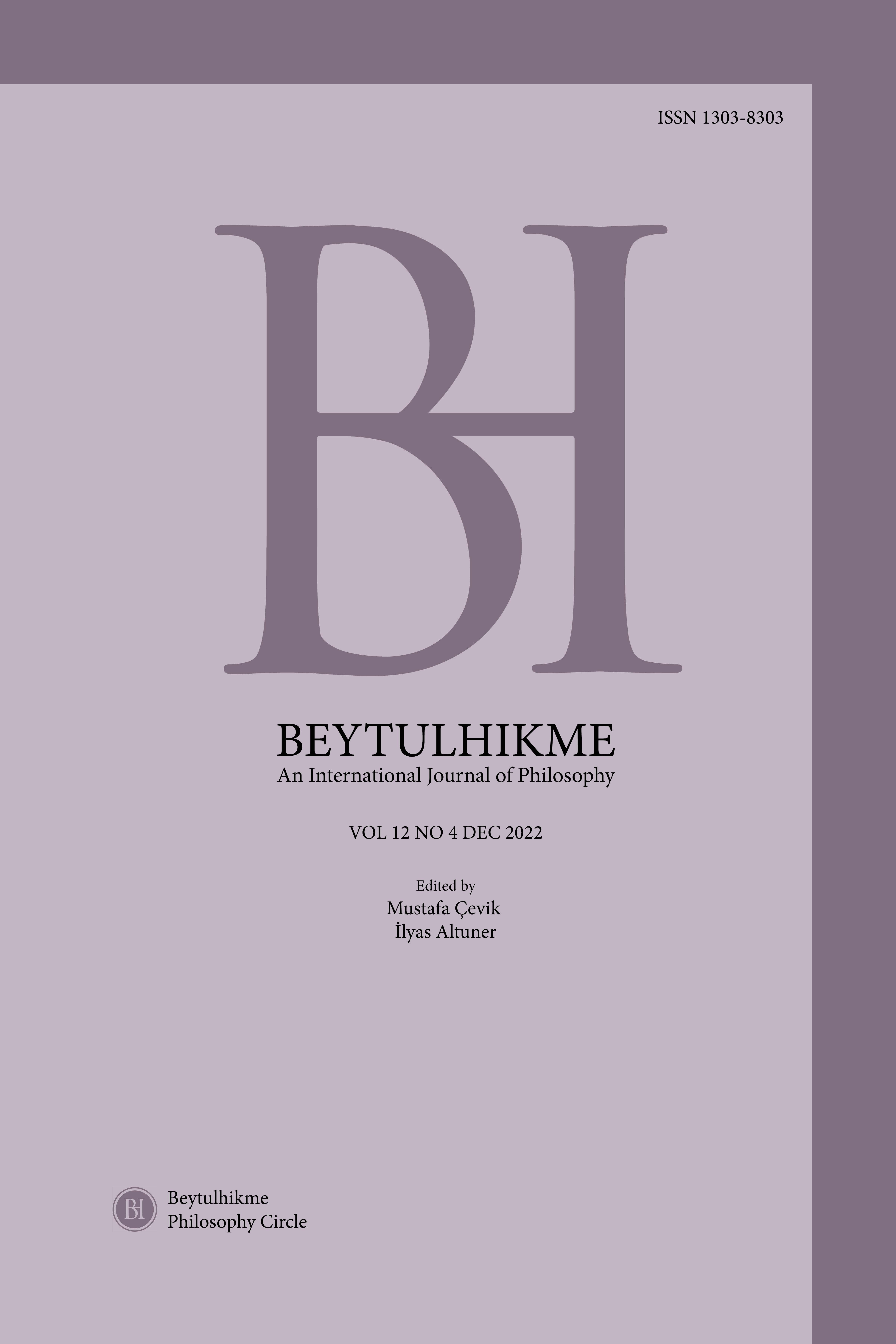Author :
Abstract
Jacques Derrida ve Ludwig Wittgenstein düşüncelerini ilişkilendirmek, oldukça ilgi çekicidir. Bunun sebeplerinden biri her iki düşünürün dil konusuna çokça vakit ayırmalarıysa, bir diğeri de birbirlerine yaklaştıkları noktalardır. Her iki düşünür dili nihai bir kaynakla ilişkilendiren özcü mantığa uzaktır. Aynı şekilde her iki düşünüre göre anlam da kaynağını sabit bir mevcudiyette bulmaz. Hem dil hem de anlam, oyun kavramıyla tarif etmenin mümkün olduğu bağlamsal bir ağda belirlenirler. Bu ağ, daima değişimlerin mümkün olduğu dinamik bir ağdır. Bununla beraber, yine her iki düşünür, bu dinamizmin anlamsal bir nihilizm şeklinde yorumlanmasına mesafelidirler. Söz konusu dinamizm dilin bir eksikliği olarak değil, aksine, onun olağan işleyişinin imkânı olarak yorumlanmalıdır.
Keywords
Abstract
It is quite interesting to relate the thoughts of Jacques Derrida and Ludwig Wittgenstein. One of the reasons for this is that both thinkers spend a reasonable amount of time on language, and the other is the points where they approach each other. Both thinkers are far from essentialist logic that associates language with a permanent source. Likewise, according to both thinkers, meaning does not find its source in a fixed presence. Both language and meaning are determined in a contextual network that it is possible to describe with the concept of a game. This network is a dynamic network where changes are always possible. Additionally, both thinkers are distant from interpreting this dynamism as a semantic nihilism. The aforementioned dynamism should not be interpreted as a deficiency of language, but rather as the possibility of its normal functioning.
Keywords
- Allison, D. B. (1978). Derrida and Wittgenstein: Playing the Game. Research in Phenomenology, 8, 93-109.
- Critchley, S., Jacques Derrida, Ernesto Laclau, & Richard Rorty. (2016). Yapıbo- zum ve Pragmatizm (C. Mouffe, Ed.; B. Tuncay, Çev.). İletişim Yayınları.
- Derrida, J. (1973). Speech and Phenomena, and Other Essays on Husserl’s Theory of Signs. Northwestern University Press.
- Derrida, J. (1981a). Dissemination, Trans. Barbara Johnson. Chicago: University of Chicago Press.
- Derrida, J. (1981b). Positions University of Chicago Press. Chicago.
- Derrida, J. (1988). Limited inc. Northwestern University Press.
- Derrida, J. (2007). Marx’ın Hayaletleri, Çev: Alp Tümertekin, 2. Baskı, İstanbul: Ayrıntı Yayınları.
- Derrida, J. (2011). Nietzschelerin Şöleni (drl. Ve çev. A. Utku ve M. Erkan). İstan- bul: Otonom Yayıncılık.
- Derrida, J. (2014). Gramatoloji, (Çev. İsmet Birkan). Ankara: Bilgesu.
- Derrida, J. (2016). Platon’un Eczanesi, (Direk, Zeynep, Çev.). Alfa.
- Derrida, J. (2020). Yazı ve Fark, (çev. P. Burcu Yalım). Metis Yayınları, İstanbul.
- Direk, Z., & Güremen, R. (Ed.). (2013). Çağdaş Fransız Düşüncesi. Minör Yayınları.
- Garver, N. (1991). Derrida’s Language-Games. Topoi, 10(2), 187-198.
- Gier, N. F. (2007). Wittgenstein and Deconstruction. Review of Contemporary Phi- losophy, 6, 174-196.
- Glendinning, S. (1998). On Being with Others: Heidegger, Derrida, Wittgenstein. Psyc- hology Press.
- Orbán, J. (1998). Language Games, Writing Games: Wittgenstein and Derrida: A Comparative Study. The Paideia Archive: Twentieth World Congress of Philosophy, 32, 83-88.
- Staten, H. (1984). Wittgenstein and Derrida. U of Nebraska Press.
- Wittgenstein, L. (1999). Yan Değiniler. (çev: O. Aruoba). İstanbul: Altıkırkbeş Yayın.
- Wittgenstein, L. (2009). Kesinlik Üstüne+ Kültür ve Değer,(çev. Doğan Şahiner). İs- tanbul: Metis.
- Wittgenstein, L. (2010). Felsefi Soruşturmalar. Metis Yayınları.
- Wittgenstein, L. (2011). Mavi Kitap Kahverengi Kitap (Doğan Şahiner, Çev.; 2. bs). Türkiye İş Bankası. Öz: Jacques Derrida ve Ludwig Wittgenstein düşüncelerini ilişkilendirmek, oldukça ilgi çekicidir. Bunun sebeplerinden biri her iki düşünürün dil konusuna çokça vakit ayırmalarıysa, bir diğeri de birbirlerine yaklaştıkları noktalardır. Her iki düşünür dili nihai bir kaynakla ilişkilendiren özcü mantığa uzaktır. Aynı şekilde her iki düşünüre göre anlam da kaynağını sabit bir mevcudiyette bulmaz. Hem dil hem de anlam, oyun kavramıyla tarif etmenin mümkün olduğu bağlamsal bir ağda belirlenirler. Bu ağ, daima değişimlerin mümkün olduğu dinamik bir ağdır. Bununla beraber, yine her iki düşünür, bu dinamizmin anlamsal bir nihilizm şeklinde yorumlanmasına mesafelidirler. Söz konusu dinamizm dilin bir eksikliği olarak değil, aksine, onun olağan işleyişinin imkânı olarak yorumlanmalıdır. Anahtar Kelimeler: Dil, anlam, bağlam, Derrida, Wittgenstein.





